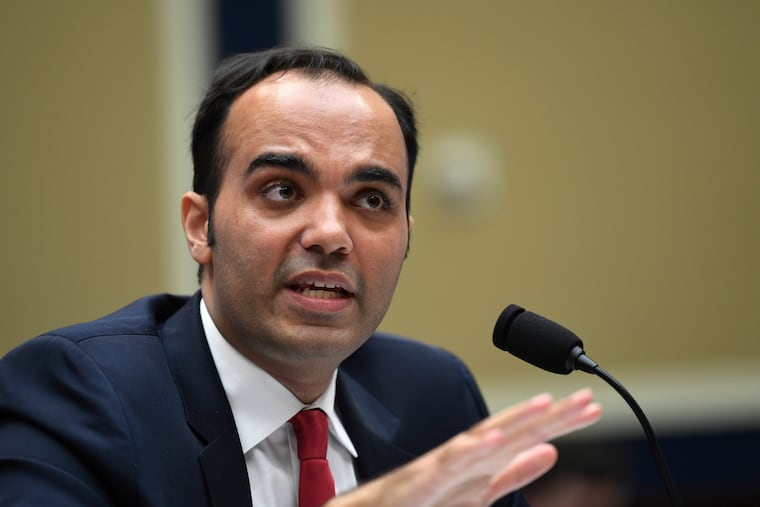Consumer Financial Protection Bureau, muzzled under Trump, prepares to renew tough industry oversight
The agency will focus first on enforcing legal protections for distressed renters, student borrowers, and others facing growing debt during the pandemic.

WASHINGTON — The Consumer Financial Protection Bureau, the watchdog created after the 2008 financial meltdown and largely muzzled in the Trump era, is poised to start barking again.
The agency will focus first on enforcing legal protections for distressed renters, student borrowers, and others facing growing debt that its previous leadership has been lax about during the pandemic.
But the CFPB — which President Joe Biden has tapped 38-year-old Rohit Chopra, a Wharton School grad, to lead — is also likely to take an unprecedentedly tough line against industry giants it finds engaging in abusive practices, former agency officials advising the Biden team say.
"It's a matter of ramping back up," said Richard Cordray, the CFPB's first director, who stepped down in late 2017. The agency under Trump was "picking at odds and ends. They ramped down, and it's a matter of changing direction."
That will mark a dramatic turn. Just last year, consumer complaints to the agency rose by 60% over 2019, agency data show, setting a new record as the economic crisis wiped out millions of jobs and pushed lower-income Americans to the brink.
Yet the relief the agency secured for consumers topped out at less than $700 million, a fraction of the $5.6 billion it collected in 2015, its high watermark. Kathy Kraninger, a Trump appointee who resigned as director of the agency last week at Biden’s request, signaled the outcome at the start of the pandemic. She said in late March that financial companies would not face penalties for violating consumer protections in the Cares Act if they made “good-faith” efforts to comply.
The approach continued the agency's more hands-off approach to corporate interests under Trump appointees. Over the course of the Trump presidency, the agency wrangled $2.3 billion in consumer relief, a steep drop from the $10.7 billion during its first five full years in operation under the Obama administration. And the agency shifted its crosshairs notably — from big-money actions against major companies including American Express, Citibank, Corinthian Colleges, JPMorgan Chase, Sprint, and Wells Fargo, to smaller-dollar rulings against more fringe firms.
"When you're only going after last-dollar scammers and small, fly-by-night companies, you're not sending a message to the big banks, big debt collectors, and big credit bureaus that there's a sheriff in town," said Ed Mierzwinski, senior director of the U.S. Public Interest Research Group's federal consumer program. "As soon as he's confirmed, Rohit will bring a renewed sense of urgency."
The White House referred questions to the CFPB, which did not respond to a request for comment. In announcing Chopra, the Biden transition said the CFPB's former student loan ombudsman now serving on the Federal Tradition Commission "has actively advocated to promote fair, competitive markets that protect families and honest businesses from abuses."
Former colleagues say they expect Chopra, an acolyte of U.S. Sen. Elizabeth Warren (D., Mass.), to use the agency’s enforcement authority to fundamentally shake up how big businesses interact with consumers where he perceives widespread abuse.
“Under a Director Chopra, I think you’ll see the agency looking at industry practices in a broader way, seeking systemic changes in matters harming consumers, not just one-off fraud cases,” said Hudson Cook lawyer Lucy Morris, who worked with Chopra as the CFPB’s then-deputy enforcement director.
Beyond reasserting the agency's role as the federal cop on the consumer beat, the Biden-era CFPB is set to push a number of rules changes retightening screws on corporate interests. Among them will be an effort to require that payday lenders determine potential borrowers' ability to repay loans by checking on their income and debt. Cordray originally proposed such a standard in 2017. But Kraninger reversed the rule last year.
The CFPB is also likely to build on debt collection rules the agency finalized late last year. The regulations limit collectors to no more than seven calls a week to borrowers — a change consumer advocates welcomed — but they opened the door for collectors to contact borrowers through other means, including e-mails and text messages.
And Democrats expect that the agency will revive a push Cordray launched — and his successors abandoned — to crack down on the fees banks charge customers when they overdraw their accounts. The effort is likely to meet with intense industry resistance: Overdraft fees generated $17 billion in revenue for banks in 2019, a study by management consulting firm Oliver Wyman found.